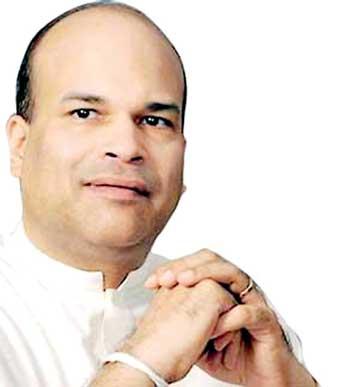Reply To:
Name - Reply Comment
To develop itself into a energy, electricity and tourism hub
 Sri Lanka is looking for integration with India to develop itself into a energy, electricity and tourism hub, Sri Lankan High Commissioner in India Milinda Moragoda said at an interactive session in India, the Indian Express reported yesterday.
Sri Lanka is looking for integration with India to develop itself into a energy, electricity and tourism hub, Sri Lankan High Commissioner in India Milinda Moragoda said at an interactive session in India, the Indian Express reported yesterday.
“We had discussions with Indian Finance Minister Nirmala Sitharaman. External Affairs Minister S Jaishankar took a personal interest in this as did National Security Adviser Ajit Doval. Our then Finance Minister Basil Rajapaksa had discussions with Dr Jaishankar and Mrs Sitharaman. We looked at three aspects: Emergency assistance, petroleum and balance of payment support. We had a credit line of $1 billion for food and supplies. Then we had a separate line of credit for petroleum and the swaps with the Central Bank, with support from RBI, for payments to the Asian Clearing Union.
“The other part of the discussion was to develop a longer-term growth strategy. For example, Indian Oil is a distributor in Sri Lanka and runs the tank jointly with us in Trincomalee. How could we make Trincomalee into an energy hub that would be a win-win for all? We are looking at integration with India in the tourism, power and wind energy sectors. Our whole national energy capacity is 4,200 megawatts, so we could create an energy grid with India and get investment. Eighty per cent of the business in Colombo port is transshipment. We have three terminals, one is government owned, the other is privately controlled, the third is a Chinese CICT and now Adani is coming with the fourth. There’s scope for two more terminals. Most of this will go to service India, which needs to trust us as a partner in its shipping network. As of now, we have the comparative advantages vis-a-vis India for deep water terminals. Similarly, given your petroleum requirements, if you set up a refinery in Trincomalee and use it to store a part of your strategic reserves, it will be a win-win for both. This requires trust. It’s a step-by-step process. It cannot be done overnight,” Mr. Moragoda said.
“The Staff level agreement with the IMF is a realistic and pragmatic first step. We have to now initiate structural reforms and take many measures on the revenue side. This is going to be a tough task because this is a staff-level agreement and has to be cleared by the IMF board.
In between, we have to take a series of steps, especially in the context of debt-restructuring. We have brought in an investment bank, Lazard, to do this and they have worked out the contours of a restructuring programme, which includes looking at our commercial, bilateral, multilateral and domestic debts and balancing them. First, we have to take some measures upfront and then move to the programme and do the restructuring. This $2.9 billion package over three years is not huge for the amount of money we need but it gives confidence to investors to come in. Remittances, which have dropped by half, could increase. And it also gives confidence for our bilateral partners like Japan. India helped us right through this year without any idea of where this was going to end. That’s why we are so grateful to India because it encouraged us to go to the IMF. Your Finance Minister Nirmala Sitharaman played a role in that. But I think the real confidence will come once the IMF board approves this agreement and actualises the programme for implementation,” he added.